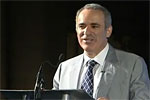



The Turing Centenary Conference was held in Manchester on June 22-25, 2012, hosted by the University of Manchester, where Turing worked in 1948-1954. The conference had the following aims:
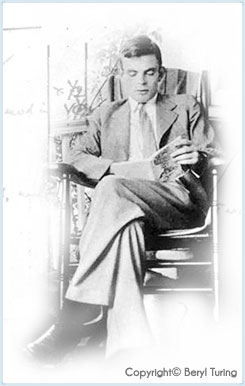 There were a large number of interesting speakers and dignitaries at the Turing Centenary, including many Turing Award winners. You can find a list of their lectures here. One of the speakers was former World Chess Champion Garry Kasparov, who described a project that reconstructed Turing's "Paper Machine".
There were a large number of interesting speakers and dignitaries at the Turing Centenary, including many Turing Award winners. You can find a list of their lectures here. One of the speakers was former World Chess Champion Garry Kasparov, who described a project that reconstructed Turing's "Paper Machine".
It is an amazing fact, Kasparov told a packed audience (at 09:00 a.m.!), that the very first chess program in history was written a few years before computers had been invented. It was designed by a visionary man who knew that programmable computers were coming and that, once they were built, they would be able to play chess. The man, of course, was Alan Turing, one of the greatest mathematicians who ever lived. Soon after the war he wrote the instructions that would enable a machine to play chess. Since there was as yet no machine that could execute the instructions he did so himself, acting as a human CPU and requiring more than half an hour per move. A single game is recorded, one in which Turing's "paper machine" lost to a colleague.
Kasparov sketched the historical context of Turing’s involvement in chess and then went on to describe how chess computer experts had reconstructed the paper machine to run on a modern day computer. The lecture was streamed live on the Internet. We will provide a link plus a full transcript and pictures in a special report this weekend.
At the end of the lecture Kasparov took part in an historic encounter: he played the first public game by a chess professional against the reconstructed Turing Paper Engine.
Video report of the historic encounter

Garry Kasparov during his lecture at the Turing Centenary
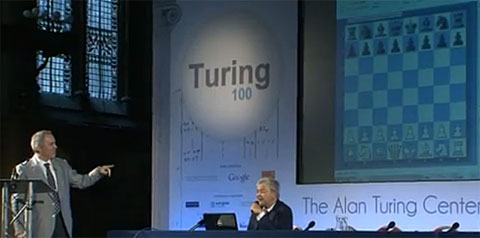
Preparing to play the original Turing engine, operated by Frederic Friedel of ChessBase

Kasparov and Friedel during the game – the engine has just lost a piece to a pawn fork
Here is the games for replay. We had the Turing engine evaluate the moves, at five seconds a move, i.e. with a deeper search than when it played Kasparov. The evaluations are displayed in the graph below the board. Note that, due to the way this engine works, the values are only for the positional criteria, not material. Also that the engine has very different opinions, depending from which side it is looking at the board.
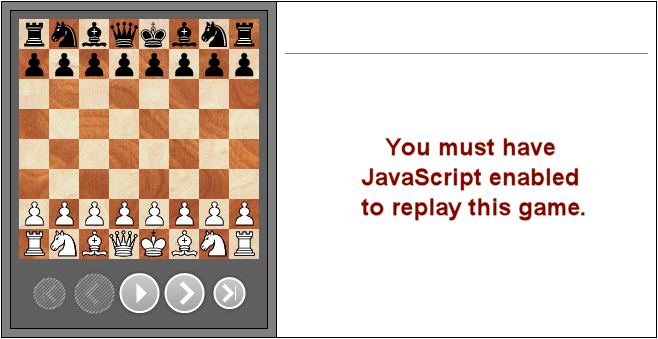
Kasparov on the Turing Paper Machine and the game he has just played against the reconstructed version
In this video interview Garry excuses the machine for its 16-move loss, saying we must remember that it was set at only two ply. He is full of praise for Turing's research and his chess program: “I suppose you might call it primitive, but I would compare it to an early car – you might laugh at them but it is still an incredible achievement. He wrote algorithms without having a computer – many young scientists would never believe that was possible. It was an outstanding accomplishment. Although it’s only thinking two moves ahead, I would have thought it would give the amateur player some serious problems. Alan Turing is one of the very few people about who you could say that if he had lived longer the world would be a different place.”
We can reveal that on the previous evening Kasparov played two practice games in his room against the engine, set at five ply. It lasted 27 and 30 moves against him.
You can experiment with the Turing Engine yourself. It runs under Fritz or any Fritz-complatible program (Rybka, Hiarcs, Junior, etc.) and can also be operated as an engine in the ChessBase program.

To download the engine click on "Service and Download" on the top of our newspage
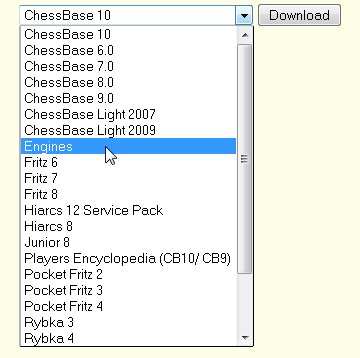
Now select "Engines" in the download dropdown menu
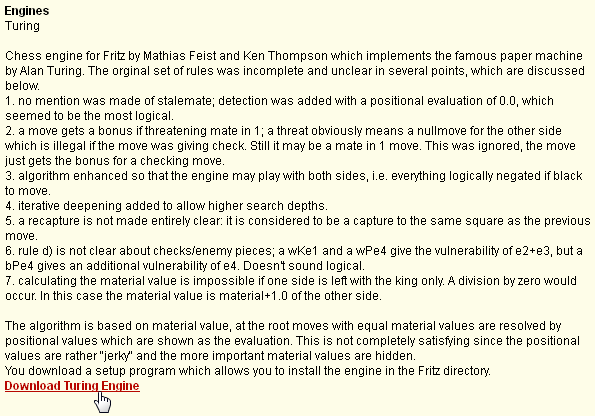
At the bottom of the engine download page you will find the Turing engine. Download the file, run it and the engine will be installed in the ChessBase directory of your hard disk. It can be selected like any other program. The entire installation of the engine takes just one or two minutes.